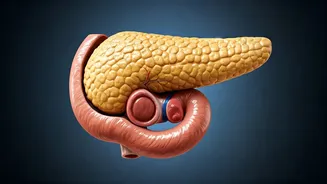Pancreas: An Overview
The pancreas, an essential organ residing in the abdomen, performs a dual role in the human body. Primarily, it's responsible for the production of crucial
enzymes that are fundamental for efficient digestion. These enzymes break down carbohydrates, proteins, and fats, enabling the body to absorb nutrients effectively. Simultaneously, the pancreas houses specialized cells that produce vital hormones, the most notable being insulin and glucagon. Insulin helps regulate blood sugar levels by facilitating glucose uptake by cells, while glucagon works in the opposite direction, releasing stored glucose when needed. Proper functioning of the pancreas ensures balanced blood sugar levels and supports the digestive process, both of which are critical for overall health and well-being. A malfunctioning pancreas can lead to numerous health problems, which is why recognizing any warning signs is crucial.
Persistent Abdominal Pain
One of the earliest and most noticeable indicators of a potential pancreatic issue is persistent abdominal pain. This pain often manifests in the upper abdomen and can sometimes radiate to the back, creating a feeling of discomfort that can be intermittent or constant. The pain can vary in intensity, ranging from a dull ache to a sharp, stabbing sensation. Frequently, it worsens after eating, particularly meals high in fat. This occurs because the pancreas is working overtime to release digestive enzymes, which, if the pancreas is inflamed or damaged, can exacerbate the pain. Ignoring this symptom is inadvisable, and if the discomfort persists for an extended period or intensifies, it is crucial to consult a healthcare professional. Persistent abdominal pain may indicate pancreatitis, pancreatic cysts, or other conditions that need prompt medical assessment.
Unexplained Weight Loss
Unexplained weight loss is another significant sign that something could be wrong with the pancreas. When the pancreas isn't functioning correctly, it might not produce enough digestive enzymes. Consequently, the body struggles to effectively digest and absorb essential nutrients from food, leading to malnutrition. This malabsorption, in turn, can contribute to unintentional weight loss, even if a person maintains a regular diet. Additionally, pancreatic cancer or other pancreatic diseases can reduce appetite, making it even harder for individuals to maintain their weight. If you're experiencing substantial weight loss without any noticeable changes in your diet or lifestyle, this warrants medical attention. Early detection is key, and a healthcare provider can conduct relevant tests to determine the underlying cause and recommend appropriate interventions.
Changes in Stool
Changes in bowel movements, particularly in the form of steatorrhea, can provide critical clues about pancreatic function. Steatorrhea, characterized by stools that are greasy, foul-smelling, and often float, is a direct result of the body's inability to digest fats properly. This inability occurs because the pancreas is not producing or releasing enough digestive enzymes (lipases) to break down dietary fats. The undigested fats then pass through the digestive system and are excreted in the stool, producing the characteristic oily appearance and odor. Another tell-tale sign may include changes in stool frequency and consistency. If you notice these issues, it is essential to consult a physician promptly. They can conduct tests to assess pancreatic function and determine if further investigations are necessary to treat the issue.
Jaundice and Skin Changes
Jaundice, a condition causing the skin and whites of the eyes to turn yellow, can be a symptom associated with pancreatic problems. This occurs when there's a buildup of bilirubin, a yellow-orange pigment created during the breakdown of red blood cells. Bile ducts, which carry bile from the liver and gallbladder to the small intestine, can become blocked due to pancreatic tumors or inflammation. This obstruction prevents bile from flowing properly, causing bilirubin to accumulate in the bloodstream and leading to jaundice. Furthermore, you might observe skin changes such as itchiness and, in some cases, the appearance of skin rashes. Any sign of jaundice should be checked by a doctor. A timely diagnosis can lead to more effective treatment outcomes and potentially prevent complications.
Uncontrolled Blood Sugar
Because the pancreas produces insulin, a hormone vital for regulating blood sugar levels, any damage to this organ can disrupt this delicate balance, resulting in uncontrolled blood sugar levels. As the insulin-producing cells are affected, they may fail to produce enough insulin, thereby leading to elevated blood sugar levels, or hyperglycemia. In other instances, the pancreas may produce insulin, but the body’s cells become resistant to it, which also leads to increased blood sugar levels. Early warning signs of altered blood sugar include frequent urination, excessive thirst, increased hunger, and unexplained fatigue. Chronic elevation in blood sugar levels can damage other organs and systems over time. Therefore, anyone who has uncontrolled blood sugar needs to consult with a healthcare professional to identify and address the issue promptly.














